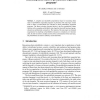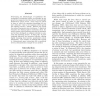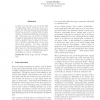150 search results - page 4 / 30 » A logic for reasoning about the probability of fuzzy events |
ENTCS
2006
13 years 8 months ago
2006
A logic for reasoning about states of basic quantum imperative programs is presented. The models of the logic are ensembles obtained by attaching probabilities to pairs of quantum...
CSL
2006
Springer
14 years 6 days ago
2006
Springer
A complete and decidable propositional logic for reasoning about states of probabilistic sequential programs is presented. The state logic is then used to obtain a sound Hoare-styl...
AAAI
1996
13 years 9 months ago
1996
Overcoming the disadvantages of equidistant discretization of continuous actions, we introduce an approach that separates time into slices of varying length bordered by certain ev...
EUSFLAT
2007
13 years 10 months ago
2007
In spite of its successes as a tool in the field of engineering, fuzzy set theory has yet to achieve the universal footing that probability theory has across the various fields ...
ECAI
2010
Springer
13 years 5 months ago
2010
Springer
Bipolarity is an important feature of spatial information, involved in the expression of preferences and constraints about spatial positioning or in pairs of opposite spatial relat...



